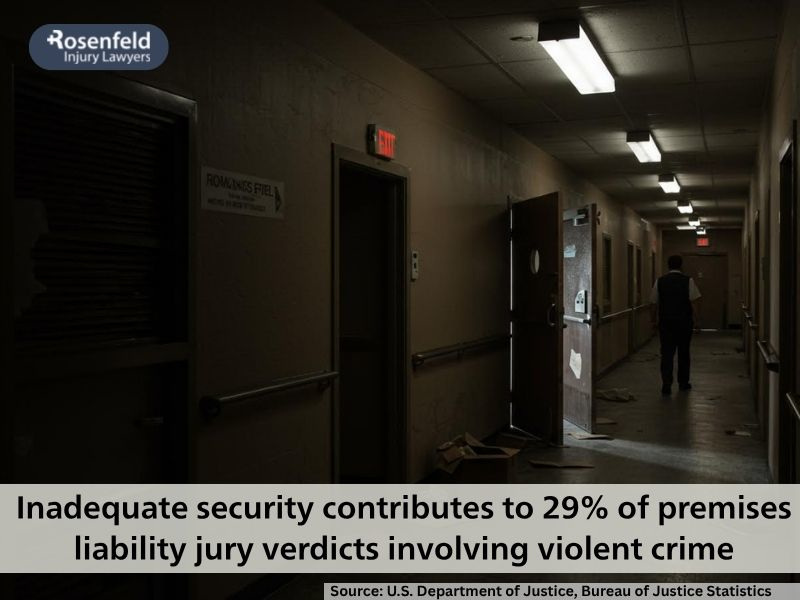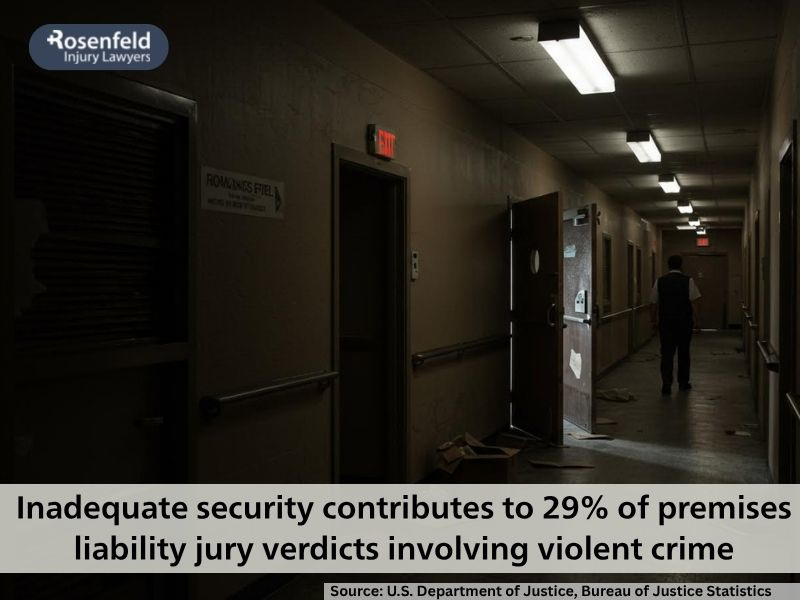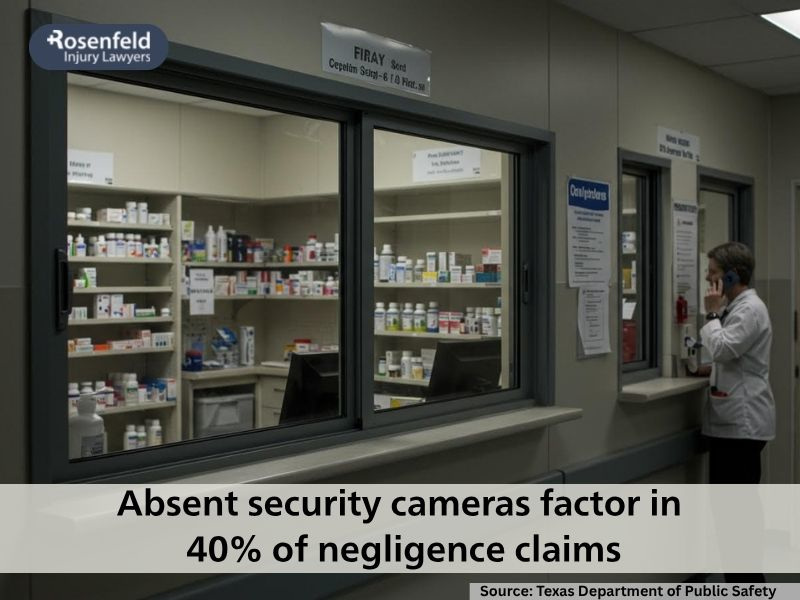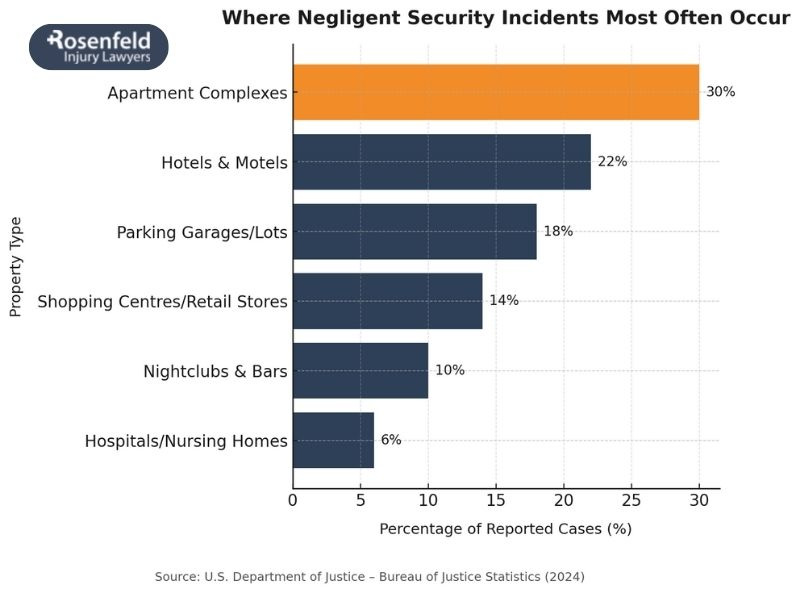What Constitutes Negligent Security?
Negligent security occurs when a property owner fails to take reasonable steps to protect visitors, tenants, or customers from foreseeable harm. Under premises liability law, owners and managers must provide adequate security measures such as working locks, security cameras, and adequate lighting to help prevent crimes like assaults or robberies.
When the owner’s negligence allows an incident to occur, victims may pursue a civil lawsuit for the harm suffered. A negligent security claim can help recover medical expenses, lost wages, and pain and suffering caused by inadequate security measures.
At our firm, we stand with victims who were hurt because someone failed to provide reasonable security measures. You are not alone, and you have the right to fair compensation under the law.

What Are Common Negligent Security Cases?
Negligent security can occur in many settings where owners fail to provide adequate security measures or ignore known safety risks. These cases often involve sexual assaults, thefts, or other crimes that could have been prevented through reasonable safety measures such as lighting, locks, or surveillance.
Sexual Abuse or Assault in Hotels and Apartment Complexes
Hotels and apartment complexes are among the most frequent sites of negligent security claims. Tenants and guests rely on property owners and managers to maintain a safe environment.
For example, a tenant may be sexually abused after management ignores repeated complaints about an unsecured lock or malfunctioning gate. In another case, a hotel guest might be attacked in a poorly lit hallway with no security camerasor security staff present.
Federal guidelines like the Department of Justice’s Crime Prevention Through Environmental Design guidelines outline proven methods to prevent crimes through proper lighting, controlled access, and visible surveillance cameras. When owners fail to meet these basic standards, victims have a right to demand compensation for the harm suffered.
Nightclubs, Bars, and Parking Lots
Negligent security cases involving nightclubs, bars, and parking spaces often result from poor lighting, lack of security personnel, or failure to control violent patrons.
For instance, a visitor may be assaulted in a poorly lit parking lot where no cameras were installed, even after previous fights had been reported. When owners know of prior criminal activity yet take no steps to improve security measures, that is recognized as negligent security and exposes them to liability.
Schools, Colleges, and Daycare Facilities
Educational institutions have a heightened duty to protect students and minors. Sexual abuse can occur when inadequate safety measures allow offenders access to classrooms, dorms, or play areas.
An example would be a staff member or visitor entering through an unlocked door or unmonitored area. When managers fail to enforce background checks, respond to reports of misconduct, or monitor vulnerable areas, the institution may face vicarious liability under the law.
Hospitals and Nursing Homes
Patients and residents of hospitals and nursing homes are particularly vulnerable to harm. Negligent security in these settings may involve an abuse by another resident or staff member because of inadequate supervision, faulty locks, or poor access control.
When the owner’s failure to ensure reasonable security measures leads to an attack, victims and families can hold the facility liable for emotional trauma, medical expenses, and other losses related to the incident.
Our law firm believes that everyone, from tenants to patients, deserves safety and dignity. If you or a loved onesuffered harm in any of these situations, we are here to listen, support you, and help you pursue justice through a negligent security claim.

What Are Adequate Security Measures?
Adequate security refers to the reasonable precautions a property owner is expected to take based on the type, size, and location of the property. The goal is not to eliminate all risk, but to reduce the likelihood of foreseeable crimes through reasonable security measures that reflect the level of danger in the area.
Examples of adequate safety measures include:
- Functioning locks and access control systems on doors, gates, and common areas.
- Well-lit entrances, stairways, and parking spaces that discourage criminal behavior.
- Properly maintained security cameras and alarm systems.
- On-site security personnel or regular patrols in high-crime areas.
- Clear visitor policies, employee screening procedures, and staff training on safety protocols.
It is important to understand that “adequate” does not mean perfect. The law only requires property owners to take reasonable precautions to deter crimes that are foreseeable based on prior incidents or known risks.
If a property has a history of criminal activity or is located in an area with elevated crime statistics, the owner must take stronger measures to provide adequate security and protect visitors and tenants from harm.
We often uncover cases where property owners breached safety procedures and provided inadequate training for staff members, leaving victims vulnerable to preventable assaults, robberies, or other crimes.
What Is Considered Negligent Security?
Security at a property is considered negligent when the owner fails to correct known safety hazards or ignores warning signs that make a crime foreseeable. Under premises liability law, a property owner’s negligence arises when they fail to provide adequate safety measures even after prior safety complaints.
Negligent security is often established when:
- The owner failed to repair or correct known unsafe conditions such as damaged locks or lighting.
- Prior incidents occurred on or near the property which made the risk of violence or theft foreseeable.
- The harm occurred in an area known for illegal activity or repeated police calls.
Common conditions that may constitute negligent security include:
- Lack of cameras in high-crime areas.
- Broken or missing locks, gates, or access controls.
- No guards or patrols despite previous assaults or robberies.
- Failure to respond to prior reports of violence or suspicious activity.
- Poorly lit stairwells or entrances that create unsafe environments.
In short, negligent security occurs when the owner’s failure to provide reasonable security measures allows preventable harm to occur. Every property has a duty to ensure visitors are protected through proper lighting, working locks, and security measures appropriate for the location and crime risk.
When owners neglect this duty, victims have the right to hold them liable for the harm suffered and to recover damages for the losses caused by such hazardous conditions.

What Damages Can Victims Recover in a Negligent Security Claim?
Victims of negligent security have the right to seek damages for the harm suffered when a property owner’s failure to provide reasonable security measures leads to injury or trauma. The amount and type of damages depend on whether the crime was foreseeable and how serious the security failures were.
You may be entitled to recover damages for:
- Medical bills and therapy, including hospital stays, counseling, and ongoing treatment for physical or psychological injuries.
- Lost income and reduced earning capacity if you were unable to work or suffered long-term effects from the attack.
- Pain and suffering, covering both physical pain and emotional distress caused by the incident.
- Property damage to your personal belongings, such as phones, jewelry, or vehicles, that were stolen or destroyed during the assault.
- Punitive damages in cases where the property owner ignored repeated safety warnings or knowingly failed to improve security measures despite a clear risk of harm.
At our firm, we understand that no amount of money can undo what happened, but fair compensation can help you rebuild your life. We stand with victims who were injured or traumatized due to negligent owners, and we are committed to helping you hold those responsible liable under the law.
How Injury Lawyer Team Can Help
At Injury Lawyer Team, we understand how devastating it is to suffer harm because someone failed to provide adequate security measures. Our attorneys are experienced in negligent security cases and are dedicated to helping victims rebuild their lives with compassion and confidentiality.
Here’s how we can help:
- Investigating the property’s safety records and prior police reports to determine whether the owner failed to correct known dangers or ignored past security threats.
- Working with security and premises experts to prove negligence, analyze surveillance cameras, lighting, and staffing levels, and show how reasonable security measures could have prevented the attack.
- Pursuing claims for both emotional and physical harm through negligent security lawsuits, ensuring you receive fair compensation.
- Offering trauma-informed, confidential representation, so you feel supported and safe throughout every step of your case.
We believe survivors deserve to be heard, respected, and protected. If you or a loved one were injured or assaulted due to negligent security, our team is here to stand with you, explain your legal options, and help you seek justice under the law.

FAQs
How does premises liability apply to negligent security cases?
Premises liability legislation holds property owners and managers responsible when dangerous conditions or inadequate security measures cause harm to visitors or tenants. In negligent security cases, this means the owner may be held liable if their failure to provide reasonable security measures allowed a foreseeable crime to occur.
What kinds of criminal activity can result from a lack of security?
A lack of security can lead to a range of crimes, including sexual assaults, robberies, physical attacks, and theft. In some cases, it may also involve other crimes such as carjackings or vandalism in poorly lit apartment complexes, office buildings, shopping centers, or retail stores. These incidents often happen when security cameras, patrols, or adequate lighting are missing or ignored.
Can victims recover for property damage caused by negligent security?
Yes. Victims may recover compensation for property damage to personal property that was lost, stolen, or destroyed during the incident. This may include items such as phones, jewelry, or vehicles damaged during an assault or robbery. These damages are often included alongside claims for medical bills, income lost while dealing with the incident, and emotional distress.
When does a lack of security become grounds for a lawsuit?
A lack of security becomes grounds for a lawsuit when the owner failed to take reasonable steps to prevent foreseeable crimes. If the area had a known history of criminal activity, or if previous complaints about broken locks, inadequate lighting, or missing security staff were ignored, that constitutes negligent security. Victims may then file a negligent security claim to seek compensation for the harm suffered.
Free Consultation for Victims Harmed Due to Negligent Security
If you or a loved one were injured, assaulted, or suffered trauma due to negligent security, we are here to help. At Injury Lawyer Team, we offer a free, confidential consultation to discuss your case and explain your legal options.
Our firm works on a contingency fee basis, which means you pay no upfront costs and no fees unless we successfully recover compensation for you.
You do not have to face this alone. Contact us today to speak with a compassionate attorney who understands negligent security claims and will stand with you every step of the way.
All content undergoes thorough legal review by experienced attorneys, including Jonathan Rosenfeld. With 25 years of experience in personal injury law and over 100 years of combined legal expertise within our team, we ensure that every article is legally accurate, compliant, and reflects current legal standards.








